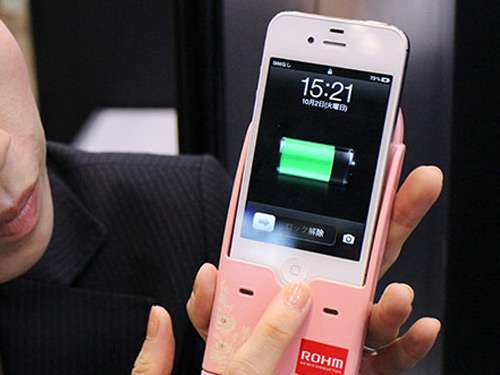October 3, 2012 report
ROHM demos compact hydrogen fuel cell

(Phys.org)—Japanese electronic parts supplier ROHM has unveiled a compact hydrogen fuel cell, capable of recharging cell phones, tablet computers, etc., at this year's CEATEC—Japan's largest consumer electronics show. The fuel cell is available in two configurations: one that serves as a phone jacket, and one that works as a standalone USB device. While it can be stored for up to twenty years, the cell is good for just one charging session.
The main attraction of the fuel cell is its size: the jacket version adds minimal bulk to a phone, while the stand-alone version is slightly bigger than a pack of cigarettes. Company reps at the show claim the fuel cell can charge a phone in about two hours. A major detraction, however, is its longevity. Once a fuel cell has been depleted, it must be thrown away, including the attractive casing.
The fuel cell functions by creating hydrogen from a very small sheet of resin-solidified calcium compound. It is then combined with polymer electrolyte power generation technology to create five watt hours of electricity. The sheet of calcium is sealed in plastic and, according to ROHM representatives, the fuel cell will work as long as it remains sealed. As such, the fuel cell could be stored for many years, making it an attractive option for long-term storage situations.
ROHM's plan, once the fuel cells become available in stores next year, is to target consumers who would purchase them as a supplemental means for recharging their phones and other electronic devices. Instead of being out of luck if their phone battery dies in the middle of the day, users can simply pop over to a convenience store, buy a fuel cell, and use it to charge their phone while they're at lunch. Of course, widespread use of such technology will lead to more unrecyclable materials heading for the local landfill; but, none of it will be toxic as is the case with batteries. The company notes that the fuel cells don't produce any harmful emissions, and if necessary can be chained or combined to produce more power. ROHM adds that they've also built a much larger, 200 watt version of the fuel cell charger for other applications.
The company hasn't revealed a price point for the fuel cells, but it's reasonable to assume that their disposable nature would necessitate a relatively low cost; that is, if ROHM wants to attract customers to this new technology.
© 2012 Phys.org



















